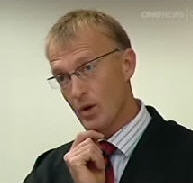Sunday Star Times
May 25 2008
Crown looks to appeal Gwaze verdict
By Donna Chisholm

Prosecutor Chris Lange
Prosecutors in the George Gwaze murder trial are trying to challenge his acquittal in a rare legal move.
Christchurch prosecutor Chris Lange says he has asked the solicitor-general to consider an appeal after the Crown failed to have the trial aborted in its final days.
The challenge stems from a dramatic development late in the trial when lawyers became aware of the "bombshell" comments of South African paediatric surgeon Heinz Rode that there were similarities between 10-year-old Charlene Makaza's symptoms and those of children who died of Aids there.
Police were told of Rode's views after a Crown witness met Rode at a conference in Hong Kong and discussed the case. Rode told Christchurch paediatrician Spencer Beasley that some HIV children in South Africa died rapidly and had anal tears and diarrhoea the symptoms New Zealand experts said were unrelated to HIV when they argued Charlene was sexually attacked and suffocated.
The development caused a flurry of behind-the-scenes debate the week before the end of the trial which cleared Gwaze of murder and sex charges. Jurors deliberated less than five hours.
Lange objected to the fact Rode's evidence was to be admitted as "hearsay" through a police statement but the judge refused to abort the trial or delay it several weeks so Rode could be called as a witness or prepare in-depth evidence. He said the jury had to hear the crux of Rode's comments or Gwaze couldn't receive a fair trial.
Gwaze's lawyer, Jonathan Eaton, said the Crown's move was very unusual but "nothing would surprise me".
Gwaze's family is considering laying a complaint with police alleging racial discrimination during the investigation. It is also trying to regain custody of Charlene's 13-year-old sister, Charmaine, who is forbidden to live with her adopted parents Gwaze and his wife Sifiso after Child Youth and Family removed her from their care during the investigation.
Gwaze's daughter Maggie told the Sunday Star-Times the investigation was botched. "We have never been people who play the race card but there comes a point when you ask what the hell is going on. We believe if we had been a different skin colour we would have been treated differently.
"We still have people saying `he got away with it, this is a technicality because police didn't do a good job'. People still think Charlene was raped and murdered."
In a special Focus section investigation today, the Sunday Star-Times examines the evidence that put the Zimbabwean vet in the dock and speaks to the defence advisers who helped to win his acquittal.
They believe that once Christchurch doctors began to suspect a sexual assault, they lost sight of other possible explanations.
Maggie, 27, said the family which had been upper middleclass at home in Zimbabwe was actually worse off in New Zealand, living in a small roughcast bungalow in the working-class Christchurch suburb of Papanui after leaving their mansion-like home in Harare three years ago. "It is torture," she said. "We feel so alone."
She said one policeman even asked her if it was a culture shock to come to New Zealand to see cars and buildings.
Sifiso, who works nights as a rest-home caregiver, says she hasn't been allowed to mourn the child she regarded as her baby daughter.
"It is bad enough to lose a child, but this ... "
Maggie said Sifiso was frightened of looking after old people now "in case they die and she gets the blame".
Asked why the family did not get Charlene treated for HIV, Maggie said children regularly died in Zimbabwe despite being aggressively treated.
On a website taken down in March on the orders of the solicitor-general, Maggie said "children die of the disease every day in Zim and I've never heard of a big deal being made of it like they did Charlene's death. Knowing Charlene's health status (her death) wasn't difficult to accept".